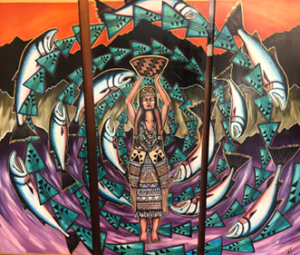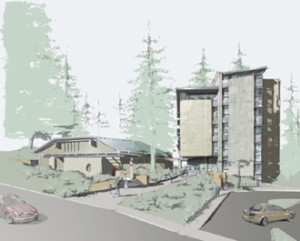
Building Wiyot Plaza: From Dream to Reality
Native American Studies Students & Faculty Creating Food Sovereignty Lab and Cultural Workspace at HSU.
by Cody Henrikson, Evie Ferreira, Carrie Tully, Amanda McDonald, and Cutcha Risling Baldy, Ph.D.

Students, Fall 2019 NAS 331: Indigenous Cultural Resource Management Practices course / photo credit: Dr. Cutcha Risling-Baldy
On a clear night in December 2019, our class left the Native American Forum at Humboldt State University (HSU) after closing the community stakeholder meeting with copious notes and full imaginations. We were ready to launch our Food Sovereignty Lab (FSL) project. To center Indigenous voices, the first hour of that meeting was set aside for Indigenous peoples, with the second bringing together diverse community voices, organizations, and researchers to help inform the direction of this lab. Thus, the story of the FSL is one of respect for Native leadership, student creativity, ambition, and perseverance.
In the Fall of 2019, the students of Native American Studies (NAS) 331: Indigenous Natural Resource Management Practices, taught by Dr. Cutcha Risling Baldy, designed this project to have lasting intergenerational impacts for our community. This course centers Indigenous knowledges and provides opportunities to learn from Native communities and leaders while helping students (re)learn the history of this land. Our history is difficult for some to internalize; facing the truth is necessary and unsettling. Yet this is what our education should lead us to: to be honest, forthright, compassionate, and to make positive social change.
We would like to call attention to how this informs us of survivance, and refer to Eve Tuck’s work on desire research – “[s]urvivance is a key component to a framework of desire…Gerald Vizenor’s…concept of survivance is distinct from survival: it is ‘moving beyond our basic survival in the face of overwhelming cultural genocide to create spaces of synthesis and renewal.’”
One of the focal points of our class was to address the issues affecting our student body and community. We agreed that Indigenous students experience a lack of representation at HSU. This is problematic because it leads to inaccessibility for Native American students to continue their cultural practices. Therefore, we feel the obligation to address the critical need for a unified Indigenous campus, appropriate representation, and cultural spaces. We selected the following research questions to guide us:
- What does Indigenous representation look like on a college campus, and what representations do we currently have here at HSU?
- What relationships does the community and HSU have with our Indigenous communities?
- How can we uplift and support these representations and relationships?
The first part of our research was to canvass the campus for existing Indigenous representations. Students also conducted interviews with Indigenous faculty, staff, and students to learn what they imagine an Indigenized campus to look like. As a result of our participatory research, data collection and analysis, we proposed the Food Sovereignty Lab.
The FSL will serve to support the resurgence of Indigenous food systems informed by traditional, ecological, and cultural knowledges. As a community-facing project, this lab is being designed for the community as a whole to achieve food sovereignty in Humboldt County and for our local tribes and tribal peoples. Our work is aimed at building best practices for Food Sovereignty in our region that respect tribal protocols, center Indigenous knowledge, and empower Native community resilience and resurgence.

Mural by Jessica Slayton, located in the Native American Forum Lobby (HSU)
In the Spring of 2019 students took our research to the CSU Student Research Competition and were recognized with a 2nd place award in the Graduate-Level Behavioral Sciences category, gaining statewide recognition for our work.
Despite the hard work of students, the initial request for space on campus to develop the lab was denied, effectively blocking the project from moving forward. But students mobilized to secure over one hundred letters of support and organized an appeal to the University Senate where we were finally granted the space needed to pursue our goal.
The Food Sovereignty Lab Steering Committee is led by a majority of Native faculty, staff, community leaders, and students. The Steering Committee navigates fundraising, design, implementation, and eventually curriculum development for the lab.
This project requires us to center and amplify Indigenous leadership, knowledge, and land stewardship. In doing so, the FSL can serve as a call to action and regenerate “moral ecology” (Risling Baldy, 2013) and respectful patterns. This is in line with our goal of increasing visibility for Indigenous students, community members, and cultures in the public sphere with an emphasis on higher-learning institutions such as this Indigenous Food Sovereignty Lab.
VISION OF THE LAB
For Everyone Who Wants to be Here in a Good Way.
Indigenous practitioners, activists, scholars, and community leaders have shaped the vision of the FSL. We acknowledge the traditional roles of dreamers in many Indigenous cultures. As Indigenous peoples we often dream of better futures for ourselves and our communities, and the FSL is the physical manifestation of our collective dreams.
This space will provide a cultural center for Indigenous studies and will strengthen current programs at HSU. The interior of the lab will include a commercial kitchen and space for basketry, art, regalia, and cultural practices. The exterior will feature a salmon cooking pit, a Native plant and food garden including interpretive signage of Native plants, and basketry designs throughout the pathways and gardens.
Our vision for the FSL is to unify our students, faculty, local tribes, and communities; to center and support Tribal sovereignty, natural resource management and preservation practices; and to provide students with culturally appropriate education in Indigenous natural resource management that respects Indigenous sovereignty and self-determination and serves our community.
We understand that when plants and ecosystems are tended to, culturally appropriate foods become that much more available for the next generation. Indigenous and non-Indignous social change agents continue to push back at those socio-ecological impacts which altered Indigenous food systems. Our lab will uplift the education and practice, and make clear the desired action needed to replicate healthy ecocultural relations.
The Native American Studies Food Sovereignty Lab will:
- Develop curriculum, internships, research opportunities, workshops, and programs.
- Provide space that supports Tribal communities in ongoing revitalization of basket weaving and regalia making.
- Strengthen the bonds between our local community, Indigenous Nations, and students at HSU.
- Integrate the values of ecological sustainability, bio-cultural sovereignty of Indigenous peoples, interconnectedness of life, and community involvement in efforts to develop reverence for food sovereignty.
PROGRAMING AND COMMUNITY PARTNERS
As we move forward developing the FSL, we are envisioning the activities this space will support.
In light of COVID-19 we have sought alternative ways to engage with food sovereignty through a virtual format. In November of 2020 we launched our ‘Food Sovereignty Speaker Series’ to engage and excite the community on the development of the FSL. The five-session series explores issues related to Indigenous food sovereignty, Traditional Ecological Knowledge, community health, and Indigenous cultural practices, and can be viewed on Youtube at @hsunas.
This spring we are hosting a film series highlighting Indigenous Food Sovereignty to promote awareness about access to traditional foods and the impacts colonization has had on Indigenous food systems.
We would like to give a special thank you to our partners – without them this project would not be possible; together our dream is stronger.
- Blue Lake Rancheria Food Sovereignty Garden
- UIHS Potawot Health Village Garden
- Wiyot Tribe Cultural & Natural Resources
- Trinidad Rancheria Cultural Department
- Native Women’s Collective
- Yurok Tribe Environmental Program
- Save California Salmon

WHERE WE ARE GOING
Remodeling 2021; Opening 2022
As we prepare for the implementation of this cutting edge lab at HSU, we are moving forward with the guidance and support of community members, scholars and organizations that can help us to develop informed, decolonized, leading approaches to food sovereignty. With support from HSU Sponsored Programs Foundation and University Advancement we will break ground on this project and begin the remodel in Fall 2021 with an anticipated opening date of Fall 2022.
From the beginning this student envisioned and designed project has been a labor of love and dedication and we look forward to our work supporting the next seven generations and beyond. The FSL will serve as more than just a space for student education; it will give our entire community an opportunity to experience the vibrancy and modern existence of Indigenous Peoples and cultures in our area. This permanent collaborative space will nurture proactive conversations regarding food sovereignty and security, and inspire active participation in writing policy to reform our food systems.
Support the Food Sovereignty Lab & Cultural Workspace
Donate: hsu.link/foodsovlab
or mail a check made out to ‘HSU Advancement Foundation’ with ‘NAS Trust A6608’ in the memo line –
Gift Processing Center
SBS 285
Humboldt State University
1 Harpst Street
Arcata, CA 95521
Subscribe to our Youtube: @hsunas
Follow us on Facebook: hsunasp
Follow us on Instagram: @hsu_nas